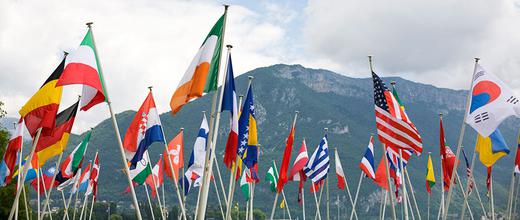The views expressed in our content reflect individual perspectives and do not represent the authoritative views of the Baha'i Faith.
Some people fear the possibility of a global government. All you have to do to confirm that supposition is search for “world government” online—you’ll see the results.
Their fear, presumably, roots itself in a perceived potential loss of individual agency and personal freedom. More government equals more laws and more oppression, some would say.
But what if a system of global governance functioned without over-centralized, controlling dictates? What if it functioned as a federated group of nation-states, each independent in the same way countries are now, but ceding their war-making powers to a worldwide body?
That’s the vision and the primary goal of the Baha’i Faith—world unity:
O Rulers of the earth! Be reconciled among yourselves, that ye may need no more armaments save in a measure to safeguard your territories and dominions. Beware lest ye disregard the counsel of the All-Knowing, the Faithful.
Be united, O Kings of the earth, for thereby will the tempest of discord be stilled amongst you, and your people find rest, if ye be of them that comprehend. Should any one among you take up arms against another, rise ye all against him, for this is naught but manifest justice….
The instruments which are essential to the immediate protection, the security and assurance of the human race have been entrusted to the hands, and lie in the grasp, of the governors of human society. – The Proclamation of Baha’u’llah, pp. 13-14.
Toward those ends, Baha’u’llah sent letters and tablets to the rulers and kings of the world during the second half of the 19th Century, admonishing them to cease their practices of warfare, slavery, excessive taxation for weaponry and oppression. He delivered a new, divine edict of peace to the world’s ruling elite, telling them that they must lay down their armaments, resolve their differences and establish unity among the nations by forming a world parliament.
But those rulers persisted in their disunity, and in quick succession after Baha’u’llah’s passing, as the Baha’i writings foretold, the world soon devolved into its two most devastating and ruinous wars. The only way out of those murderous global bloodbaths, Abdu’l-Baha said, is international unity:
During the last six thousand years nations have hated one another, it is now time to stop. War must cease. Let us be united and love one another and await the result. We know the effects of war are bad. So let us try, as an experiment, peace, and if the results of peace are bad, then we can choose if it would be better to go back to the old state of war! Let us in any case make the experiment. If we see that unity brings Light we shall continue it. For six thousand years we have been walking on the left-hand path; let us walk on the right-hand path now. We have passed many centuries in darkness, let us advance towards the light. – Abdu’l-Baha in London, pp. 61-62.
As a way to get to that state of unity and stop all war, the Baha’i Faith offers humanity a very definite and detailed plan for peace. Baha’is all over the world advocate for and work toward the spiritual vision that guides that comprehensive peace plan. The Guardian of the Baha’i Faith, Shoghi Effendi, described beautifully what Baha’is hope and trust the Baha’i Peace Plan will develop into, and what the United Nations and its successors will eventually become:
Let there be no mistake. The principle of the Oneness of Mankind—the pivot round which all the teachings of Baha’u’llah revolve—is no mere outburst of ignorant emotionalism or an expression of vague and pious hope. Its appeal is not to be merely identified with a reawakening of the spirit of brotherhood and good-will among men, nor does it aim solely at the fostering of harmonious cooperation among individual peoples and nations. Its implications are deeper, its claims greater than any which the Prophets of old were allowed to advance. Its message is applicable not only to the individual, but concerns itself primarily with the nature of those essential relationships that must bind all the states and nations as members of one human family. It does not constitute merely the enunciation of an ideal, but stands inseparably associated with an institution adequate to embody its truth, demonstrate its validity, and perpetuate its influence. It implies an organic change in the structure of present-day society, a change such as the world has not yet experienced. It constitutes a challenge, at once bold and universal, to outworn shibboleths of national creeds—creeds that have had their day and which must, in the ordinary course of events as shaped and controlled by Providence, give way to a new gospel, fundamentally different from, and infinitely superior to, what the world has already conceived. It calls for no less than the reconstruction and the demilitarization of the whole civilized world—a world organically unified in all the essential aspects of its life, its political machinery, its spiritual aspiration, its trade and finance, its script and language, and yet infinite in the diversity of the national characteristics of its federated units. – Shoghi Effendi, The World Order of Baha’u’llah, p. 42.
Shoghi Effendi went on to describe, in detail, what a peaceful federation of nations could look like:
Some form of a world super-state must needs be evolved, in whose favor all the nations of the world will have willingly ceded every claim to make war, certain rights to impose taxation and all rights to maintain armaments, except for purposes of maintaining internal order within their respective dominions. Such a state will have to include within its orbit an international executive adequate to enforce supreme and unchallengeable authority on every recalcitrant member of the commonwealth; a world parliament whose members shall be elected by the people in their respective countries and whose election shall be confirmed by their respective governments; and a supreme tribunal whose judgment will have a binding effect even in such cases where the parties concerned did not voluntarily agree to submit their case to its consideration. A world community in which all economic barriers will have been permanently demolished and the interdependence of Capital and Labor definitely recognized; in which the clamor of religious fanaticism and strife will have been forever stilled; in which the flame of racial animosity will have been finally extinguished; in which a single code of international law — the product of the considered judgment of the world’s federated representatives — shall have as its sanction the instant and coercive intervention of the combined forces of the federated units; and finally a world community in which the fury of a capricious and militant nationalism will have been transmuted into an abiding consciousness of world citizenship — such indeed, appears, in its broadest outline, the Order anticipated by Baha’u’llah, an Order that shall come to be regarded as the fairest fruit of a slowly maturing age. – Ibid., pp. 40-41.
How does that sound to you?

















Comments
Sign in or create an account
Continue with Facebookor